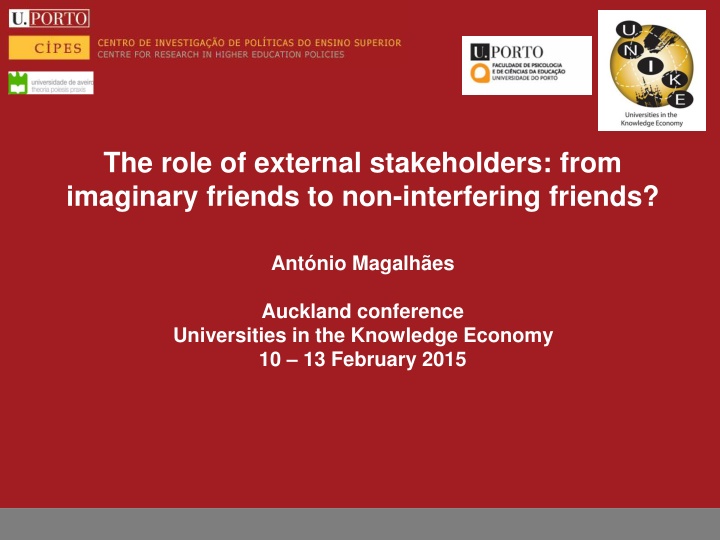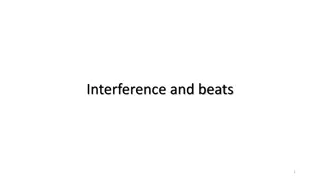
The Role of External Stakeholders in Higher Education Governance
Explore the influence of external stakeholders on university governance, from the shift towards governance in higher education to the impact of New Public Management and Boardism. Discover how external stakeholders shape governance structures and influence decision-making processes in European universities.
Download Presentation

Please find below an Image/Link to download the presentation.
The content on the website is provided AS IS for your information and personal use only. It may not be sold, licensed, or shared on other websites without obtaining consent from the author. If you encounter any issues during the download, it is possible that the publisher has removed the file from their server.
You are allowed to download the files provided on this website for personal or commercial use, subject to the condition that they are used lawfully. All files are the property of their respective owners.
The content on the website is provided AS IS for your information and personal use only. It may not be sold, licensed, or shared on other websites without obtaining consent from the author.
E N D
Presentation Transcript
The role of external stakeholders: from imaginary friends to non-interfering friends? Ant nio Magalh es Auckland conference Universities in the Knowledge Economy 10 13 February 2015
Introduction NPM and New Governance Boardism in European universities The role of external stakeholders Concluding remarks
Introduction In higher education the shift from governing to governance relied on the increased institutional autonomy, based on the assumption that the more autonomous institutions are the better they respond to change in their organisational environment and better is their performance Universities reconceptualised as complete organizations (Brunsson & Sahlin Adersen, 2000) mimicking corporations is driving the shift from a republic of scholars to a stakeholder organization (Bleiklie & Kogan, 2007)
New Public Management driving governance reforms by introducing private sector management tools The presence of external stakeholders became a mantra for the governance structures To what extent external stakeholders influence the boards? (Perceptions of Rectors and Senates about the role external stakeholders actually perform and should perform)
New Governance In interaction with and reaction to the most influential NPM- driven reforms, New Governance (Salamon, 2002) have been reframing the effects of NPM by emphasizing the collaborative features of third-party government - accountability + collaboration
Boardism in European universities Boardism: a distinctive governance praxis in higher education involving both normative assumptions and technical and practical elements stemming from corporate-like organisations in interaction/tension with academic self-governance. It impinges on and legitimises the structure of governance and influences its practices. Featured by: - the decrease of academic self-governance - the increase of managerial governance - increase of external stakeholders influence.
Boardism in European universities The implementation of boards in higher education reflects, according to the stakeholders theory, both a normative and instrumental approach to governance (Mainardes et al., 2011). The normative approach - how universities should operate on the basis of social and political values and principles? The instrumental approach - how universities manage the core academic activities? External stakeholders representation unfold the normative stance emphasising that boardism benefits management and governance and an instrumental stance as they are expected to bring into universities a clearer expression of the changes and needs of the organisational environment.
Boardism in European universities Five parallel surveys administered in 2011 under the framework of TRUE project funded by ESF (EUROHESC). Rectors and Senate members 26 European higher education institutions in 8 countries (France, Germany, Italy, the Netherlands, Norway, Portugal, Switzerland, United Kingdom
Boardism in European universities In Italy, Norway, Portugal boardism assumes a mitigated character, the external stakeholders are a minority chosen by internal members of the board (normative approach) In France and Switzerland the influence of external board members is in tension with the reinforced power of the academic leadership In Germany the strong influence of academics promotes resilience to boardism In United Kingdom and the Netherlands boardism prevails
The role of external stakeholders Aggregated percentages of "agree" and "strongly agree" Rectors Senate Member 77.3% To what extent do you agree with the following statements? External board members represent the interests of the society at large 47.9% External board members are representative of particular interest groups 45.5% 52.7% External board members represent the "owners"/public authorities 40.9% 44.0% External board members play a vital role in the decision making processes 63.6% 42.9% External board members have an important role in strategic decisions 68.2% 49.4% External board members have too much (decision making) power 4.5% 23.5% External board members play a symbolic role 23.8% 30.5% External board members are not adequately prepared for their function 18.2% 29.1% External board members have insufficient knowledge about university affairs 27.3% 36.6% External board members are accepted by the academic community 68.2% 44.3% External board members contribute to university development with important experience or skills 77.3% 43.7%
The role of external stakeholders Aggregated percentages of "agree" and "strongly agree" 100% External Board members should Bring in outside opinions and perspectives Be allies of the university leadership team in relation to political authorities Improve the accountability of the university 95.2% 90.5% Contribute with their expertise to university development Help increase the legitimacy of the university 90.5% 90.5% Reinforce the regional integration of the university Advise university leadership on management (and leadership) issues Help shape the particular profile of this university 76.2% 71.4% 71.4% Participate in university decision making 61.9% Contribute to research cooperation with private sector actors Contribute to the research agenda at this university 57.1% 38.1%
Respondents views reflect the need to promote management efficiency and governance accountability to multiple stakeholders. Rectors see external stakeholders representing the interests of the society at large and brining to the university outside beliefs and pressures (normative approach) Rectors see external stakeholders bringing in important skills and experience (instrumental approach) Senate members see external stakeholders as representing particular interests (instrumental approach) Increasing influence of external stakeholders as non-interfering allies with teaching and research FROM IMAGINARY FRIENDS TO NON-INTERFERING ALIES?






















